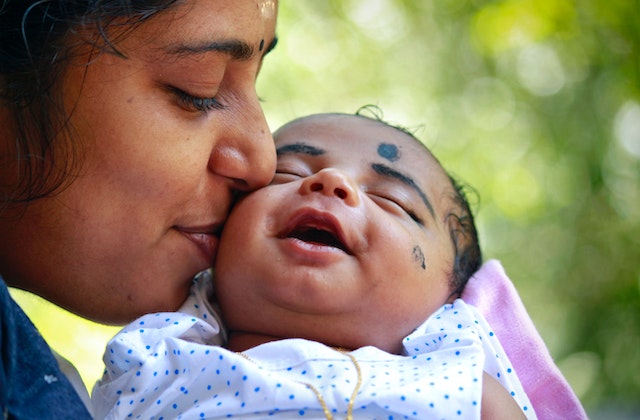
It’s common for new parents to feel frustrated when their baby won’t sleep. However, they are not alone. Getting quality sleep is essential for a child’s overall well-being and development which is why parents are concerned about how to break the cycle of an overtired baby.
Adequate sleep during infancy and early childhood is particularly important as it facilitates the development of behavioral and emotional control and higher-order cognition. Sleep is a basic human requirement that is as crucial for our physical well-being as proper nutrition. A lack of sleep can be a source of stress for our bodies, affecting us both physically and emotionally.
When a baby becomes overtired, it means their body has gone beyond being ready to sleep. This state of physical fatigue disrupts the body’s homeostasis, which is the state of balance within the body. It also activates the stress-response system, leading to a cycle of difficulty falling and staying asleep. To help break this cycle, here are 5 expert tips for parents to consider.
Further
When you or your baby become overtired, stress hormones like cortisol and adrenaline flood the bloodstream, causing physical and emotional stress. These “fight or flight” hormones can lead to increased alertness, faster heart rate, raised blood pressure, and muscle tension. Despite the physical fatigue, the mind remains alert and agitated.
An overtired baby is often unable to settle and may experience frequent night wakings, early mornings, and short naps. This can lead to a vicious cycle of poor sleep and restlessness. Unlike adults who become lethargic when overtired, babies and young children often become hyperactive and distressed.
How Can I Identify If My Baby Is Just Tired Or Overtired

It can be challenging to differentiate between an under-tired and an overtired baby since not all infants exhibit clear signs of fatigue. However, if you’re a parent, you’re likely familiar with the tell-tale signs of an overtired baby: fussiness, irritability, and sometimes clumsiness.
It’s worth noting that babies may display resistance in different ways, which can help you distinguish between under-tiredness and overtiredness. For instance, an overtired baby may become highly active just before bedtime, whereas an under-tired baby may cry and resist sleep. You may also notice key differences in their behavior during naptime.
Another indicator of overtiredness is when a child takes extended naps during the day, which can be difficult to interrupt. However, they may be restless during naptime and wake up frequently. On the other hand, under-tired babies typically don’t show many symptoms during the daytime, apart from waking up earlier than usual. Overtired children may exhibit daytime irritability and a lack of focus as well.
How To Break The Cycle Of An Overtired Baby
It’s important to note that the amount of sleep a baby needs can vary depending on their age. Newborns usually sleep between 16 to 20 hours a day, with sleep periods lasting from 2 to 4 hours. As babies grow, the amount of sleep they need decreases, but their sleep periods become more extended.
By the age of 6 months, most babies will sleep for around 14 hours in 24 hours. At 9 months, they’ll need around 13 hours of sleep, while at 12 months, most babies will need around 12 hours of sleep. As your child grows into a toddler, their sleep needs will continue to decrease, but they’ll still need around 11 to 14 hours of sleep per day.
It’s important to note that these are just general guidelines, and every child is different. Some children may need more or less sleep than others. As a parent, it’s essential to pay attention to your child’s sleep patterns and adjust their sleep schedule accordingly to ensure they get the rest they need for healthy development.
1. For newborns at 0 to 3 months

14 to 17 hours of sleep within 24 hours is normal for preemies, though up to 22 hours is in the realm of normal for preemies. Sleep typically happens in spurts during the day and at night, sometimes lasting only an hour or two at a time.
2. For older babies at 4 to 12 months
12 to 16 hours of sleep within 24 hours is typical. At least two to three of those hours should be daytime naps. Over time, babies gradually start sleeping for longer stretches at night.
A four-month-old might sleep for a six-or eight-hour stretch at night, while a six-month-old can go for 10 or 11 hours. As your baby nears her first birthday, she’ll sleep between 10 and 12 hours at night. For both age groups, a sleep stretch that’s significantly longer than your baby’s norm can seem unusual.
6 Tips On How You Can Break The Cycle Of An Overtired Baby?
Below are a few tips that can break the cycle of baby overtiredness and help them get the rest they need:
1. Don’t Keep Them Awake For Too Long During The Day
We want to balance enough daytime sleep and awake time each day. Keeping your baby awake for more extended periods during the day will not always lead to longer, more restful naps unless their awake times are way too short.
Babies develop most effectively when their wake times are regular and brief. Their bodies overtire if we keep them awake for too long between sleep cycles. As a result, the body releases adrenaline, which disturbs sleep.
2. Check Your Baby’s Nutrition And Hydration Levels
Overtiredness can lead to poor sleep, which can then lead to crankiness and fussiness. It can also lead to problems with feeding and weight gain.
By making sure your baby is getting enough nutrition and hydration, you help to break this cycle and ensure that your baby is getting the best possible start in life. Some of the ways you can help your baby get enough nutrition are by breastfeeding if possible.
Give your baby plenty of opportunities to feed during the day. Make sure you are offering a variety of foods and drinks throughout the day so that your baby gets a variety of nutrients. A healthy diet is essential for a growing baby.
3. Create A Relaxing Bedtime Routine

The most important step in getting your baby to sleep is establishing a bedtime routine. This can include things like reading books or taking baths, which help signal that it’s time for you both to go into sleep mode.
Other examples can be a nappy or diaper change, cuddling, putting them into their swaddle or sleeping bag, and saying a sleep phrase such as “It’s sleepy time now”.
These steps, replicated in the same order each nap time, will act as a really strong cue to your baby that it is time for sleep. For bedtime in the evening, you might want to have a slightly longer routine to help your baby wind down from their day.
Often, babies and toddlers can have a build-up of tiredness as the day progresses, so make sure their bedtime routine isn’t too stimulating or overly drawn out.
4. Don’t Let Them Get Too Hungry Or Too Full
A baby who is too hungry or too full will have a more challenging time falling asleep. Always try to feed them about an hour before bedtime so they’re not too hungry or too full when it’s time to sleep.
5. Don’t Push Or Force Bedtime
If you want to avoid having an overtired baby, you must focus on bedtime. Bedtime is a crucial part of the day. It has a significant impact on sleep quality and can influence the following morning.
We move up bedtime when our infant is in a cycle to allow them a proper bedtime. even if this necessitates an excessive amount of awake time. This frequently backfires and makes your child sleepy when they go to bed, which causes extra nighttime awakenings and an additional early morning.
6. Keep The Environment Conducive To Sleep
A dark room with white noise in the background will be more relaxing for your baby than a bright, loud room. This will help them fall asleep more quickly and stay asleep longer.
NOTE: You must note how much sleep a baby will need depending on their age:
- A 1-month-old should get about 14 to 17 hours of sleep a day. That’ll usually break down to about eight to nine hours at night (with your baby waking up about every three hours to feed and going right back to sleep) and another seven to nine hours in naps during the day.
- A 2-month-old should get a total of around 12 to 16 hours of sleep a day. Expect her to get approximately eight to 10 hours of sleep at night (waking up every four to six hours to feed) and four to eight hours of nap time.
- A 3-month-old should get about nine to 10 hours at night (again, with some nighttime feeds) and a few naps of 90 minutes to two hours each during the day.
- By four months, your baby should be sleeping between 12 and 15 hours a day, with two or three daytime naps that total around three to four hours, and about 10 to 11 hours of sleep at night (with fewer feeds overnight).
- When your baby nears 6 months old, she should be sleeping about nine to 11 hours at night, with two longer naps during the day. She’s now capable of “sleeping through the night” — or sleeping for six to eight hours at a time most nights.
Causes of Tiredness In Babies
If your baby is showing signs that they may be in a sleep-deprived state, the most common factors that may be contributing to the exhaustion are consistently:
- Experiencing broken sleep (night waking)
- Being overstimulated (too much and for too long)
- Short naps
- Being awake for too long (i.e., always up past their age-appropriate wake window)
- Early waking
Signs Of An Overtired Baby

Sometimes it’s obvious that your baby is overtired, but other times the signs are subtle. Here’s what to watch for in your baby:
- Hard time settling down for sleep.
- Only takes brief catnaps instead of full-blown naps.
- Hardly get a lot of sleep at night.
- Very cranky or fussy.
- Has an insatiable appetite (these babies are often described as “hungry babies”).
- Less capable of dealing with frustration or pain
- More prone to meltdowns (in an older baby).
- Displays frequent physical or crying outbursts
- Falls asleep at random times during the day (in the high chair when eating, for instance, or as soon as she hits the stroller, even if it’s not naptime).
- Requires constant attention from you when she’s awake
- Wants to be held continuously; fusses in your arms, but cries whenever you put her down;
- Likes to be jiggled or rocked endlessly
- Experiences extreme separation anxiety
- May feed briefly or fall asleep before the feed is completed.
- Difficulty in getting them to smile or make eye contact.
Conclusion
An overtired baby is a baby who has been awake for a longer time than their little bodies can handle. This triggers a stress response, which includes the release of hormones like cortisol. As a result, it becomes even more challenging for the baby to settle down and fall asleep.
The longer a baby stays awake, the more overtired they become. This makes it difficult for them to fall asleep quickly and stay asleep throughout the night. However, there are various causes of an overtired baby, including feeding issues, sleep problems, teething, skipped naps, a late bedtime, or restless sleep.
It is crucial to remember that babies need a lot of sleep to support their development. When they don’t get enough sleep, it can be challenging to break the cycle of over-tiredness. Therefore, it’s crucial to recognize the signs of an overtired baby and take action to help them get the rest they need.
Leave a Reply
You must be logged in to post a comment.